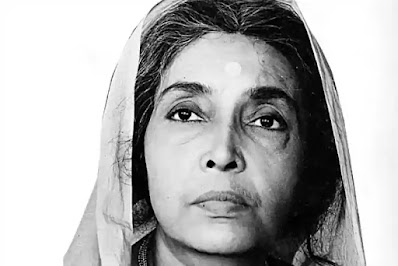Also Read
Chhaya Dattar try to create self-authenticating reflective spaces that liberate by disconnecting their women characters from their patriarchally constructed social ties. Chhya Dattar, in her autobiographical story 'In Search of me', describes her experiences as a social worker in the tribal world. While recording, the unionised activities of the farm labours, who are mostly, women. These women are cut off temporarily from her own feminist problems. Dattar experiences an inexplicable contentment that comes through the connection with one's self, symbolised in the story by the author's uninvited communion with tribal landscape that frees her, for those few days, from her social fears and uncertainties.
 |
| Chhaya Dattar |
Dattar's response to her surroundings possesses a poetic and dramatic intensity that articulates her newly found energy and creativity and she begins to reconstitute her-self by looking at what has constituted her. The act of analysing this discovery First part, strengthens her to exert her own agency over her controlling family members. Apart from the contemplative spaces, Dattar finds empowerment from watching the tribal women unveil their individuality, by using their voices to assert their concerns. Their individual invisibility begins to shatter as they try to make visible collective solidarity.
The transformed spectacle, of the otherwise yielding tribal women into loud voices, clearly articulating their right to decent and respectful human hood, empowers the author to plan her own escape from the confinement of objectification. Dattar, thus, shows that the individual spaces of feminist liberation are hinged on the interdependence of women. The collective solidarity of women, in Dattar's vision, punctuates the growth. It is unique and personal because power is derived from the collective vocal and active marginality. Dattar asserts that, "It is the women's community that can enable each woman to claim with authority the unique identity and freedom that has been denied to her by the patriarchal community. 14 Dattar's vision of feminist liberation provide avenues of becoming in the world as the registering of women's experiences, in her story, is framed by an engagement with their denial of dependence and self-sacrifice. Freedom, in the writings of both the authors, is primarily a mental phenomenon....where women think to prepare for a transformation of consciousness. Dattar provides images of feminist subjects, actively creating their own destinies and these images stand in contrast to the iconic figure of the female as passive, culturally fixed in an objective relationship in which she is always the inferior.